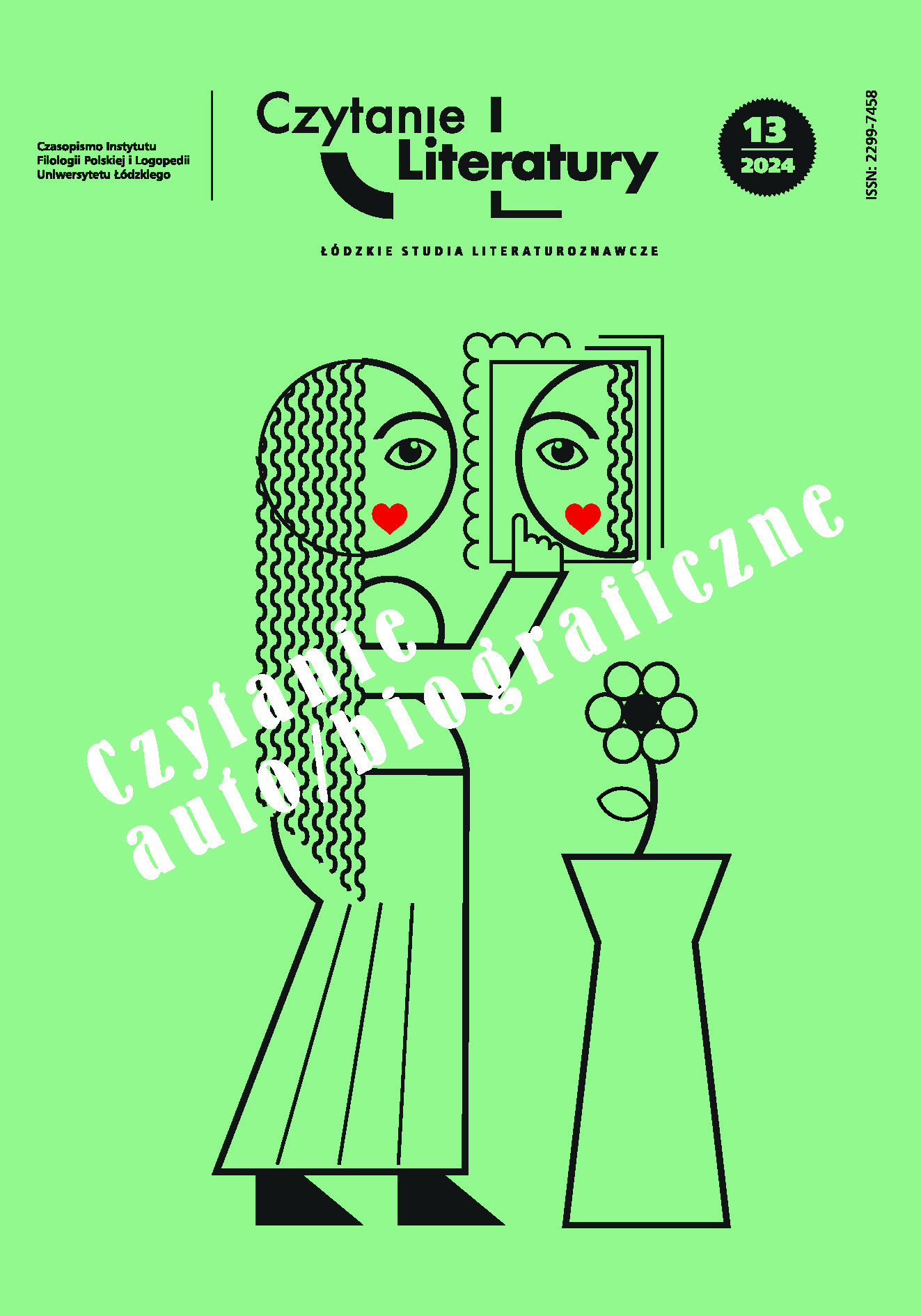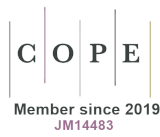Epistemic Disruptions. Autofiction and Identity Politics in Paul B. Preciado’s Can the Monster Speak? (2020) and Kim de l’Horizon’s Blutbuch (2022)
DOI:
https://doi.org/10.18778/2299-7458.13.03Słowa kluczowe:
autofiction, identity politics, autotheory, memory, queer studiesAbstrakt
The paper examines contemporary autofictional texts about queer identities in the context of current debates on identity politics. Paul B. Preciado’s Can the Monster Speak? (2020) and Kim de l’Horizons’s Blutbuch (2022) reflect queer identities in the form of transgressive and transitory writing which blurs the boundaries between academic and fictional discourse and ultimately leads to a hybridisation of the narrative. Both texts use autofiction as a means of epistemic disruption, that is as a critical questioning of Western epistemology, especially with regard to academic discourse (Preciado) and cultural memory (de l’Horizon). The ‘I’ of the autofiction becomes the catalyst of an anti-hegemonic knowledge and anti-hegemonic discourse and thus performs a core concern of identity politics in a literary way, namely the claiming of a subject and speaker position in the hegemonic discourse. At the same time, the aporias of identity politics discourses also become clear when looking at both autofictions.
Pobrania
Bibliografia
Amlinger, Carolin. “Literatur als Soziologie. Autofiktion, soziale Tatsachen und soziologische Erkenntnis.” In Autosoziobiographie. Poetik und Politik, eds. Eva Blome, Philipp Lammers, Sarah Seidel. Stuttgart: Metzler, 2022, 43–65.
Google Scholar
DOI: https://doi.org/10.1007/978-3-662-64367-9_3
Appiah, Kwame Anthony. “The Politics of Identity.” Daedalus, vol. 135, no. 4, (2006), 15–22.
Google Scholar
DOI: https://doi.org/10.1162/daed.2006.135.4.15
Ashcroft, Bill; Griffiths, Gareth; Tiffin, Helen. Postcolonial Studies. The Key Concepts. London–New York: Routledge, 2013.
Google Scholar
DOI: https://doi.org/10.4324/978023777855
Blome, Eva. “Rückkehr zur Herkunft. Autosoziobiografien erzählen von der Klassengesellschaft.” DVJs, vol. 94 (2020), 541–571.
Google Scholar
DOI: https://doi.org/10.1007/s41245-020-00118-y
Blome, Eva; Lammers, Philipp; Seidel, Sarah eds. Autosoziobiographie. Poetik und Politik. Stuttgart: Metzler, 2022.
Google Scholar
DOI: https://doi.org/10.1007/978-3-662-64367-9
Blome, Eva; Lammers, Philipp; Seidel, Sarah. “Zur Poetik und Politik der Autosoziobiographie.” In Autosoziobiographie. Poetik und Politik, eds. Eva Blome, Philipp Lammers, Sarah Seidel. Stuttgart: Metzler, 2022, 1–14.
Google Scholar
DOI: https://doi.org/10.1007/978-3-662-64367-9_1
Bremerich, Stephanie. Erzähltes Elend. Autofiktionen von Armut und Abweichung. Stuttgart: Metzler, 2018.
Google Scholar
DOI: https://doi.org/10.1007/978-3-476-04579-9
Burgelin, Claude; Grell, Isabelle; Roche, Roger-Yves eds. Autofiction(s). Colloque de Cerisy. Lyon: Presses universitaires de Lyon, 2010.
Google Scholar
DOI: https://doi.org/10.4000/books.pul.3546
Butler, Judith. Bodies that Matter. On the Discursive Limits of Sex. New York: Routledge, 1993.
Google Scholar
Butler, Judith. Gender Trouble. Feminism and the Subversion of Identity. New York: Routledge, 1990.
Google Scholar
Casas, Ana ed. La autoficción. Reflexiones teóricas. Madrid: Arco/Libros, 2012.
Google Scholar
Castro Varela, María do Mar; Dhawan, Nikita. Postkoloniale Theorie. Eine kritische Einführung. Bielefeld: Transcript, 2020.
Google Scholar
DOI: https://doi.org/10.36198/9783838553627
Colonna, Vincent. Autofiction & autres mythomanies littéraires. Paris: Tristram, 2004.
Google Scholar
Danius, Sara; Jonssson, Stefan; Spivak, Gayatri. C. “Interview with Gayatri Spivak,” Boundaries, vol. 20, no. 2, (1993), 24–50.
Google Scholar
DOI: https://doi.org/10.2307/303357
Darrieussecq, Marie. “L’autofiction: un genre pas sérieux.” Poétique, no. 107, (1996), 369–380.
Google Scholar
Delaume, Chloé. La Règle du je. Autofiction: un essai. Paris: PUF 2010.
Google Scholar
DOI: https://doi.org/10.3917/puf.delau.2010.01
DiAngelo, Robin. What Does It Mean To Be White? Developing White Racial Literacy. New York: Peter Lang, 2016.
Google Scholar
DOI: https://doi.org/10.3726/978-1-4539-1848-7
Dix, Hywel Roland ed. Autofiction in English. Cham: Springer International Publishing, 2018.
Google Scholar
DOI: https://doi.org/10.1007/978-3-319-89902-2
Dotson, Kristie. “Tracking Epistemic Violence, Tracking Practices of Silencing.” Hypatia, vol. 26, no. 2, (2011), 236–257.
Google Scholar
DOI: https://doi.org/10.1111/j.1527-2001.2011.01177.x
Doubrovsky, Serge. Fils. Paris: Éditions Galilée, 1977.
Google Scholar
Doubrovsky, Serge; Lecarme, Jacques; Lejeune, Philippe eds. Autofictions et Cie. Nanterre: Université de Paris X, 1993.
Google Scholar
Effe, Alexandra; Lawlor, Hannie. “Introduction. From Autofiction to the Autofictional.” In The Autofictional. Approaches, Affordances, Forms, eds. Alexandra Effe, Hannie Lawlor. Cham: Springer International Publishing, 2022, 1–18.
Google Scholar
DOI: https://doi.org/10.1007/978-3-030-78440-9_1
Ernst, Christina. “Transclasse und transgenre. Autosoziobiographische Schreibweisen bei Paul B. Preciado und Jayrôme C. Robinet.” In Autosoziobiographie. Poetik und Politik, eds. Eva Blome, Philipp Lammers, Sarah Seidel. Stuttgart: Metzler, 2022, 257–273.
Google Scholar
DOI: https://doi.org/10.1007/978-3-662-64367-9_12
Fournier, Lauren. Autotheory as Feminist Practice in Art, Writing, and Criticism. Cambridge/Mass.: MIT Press, 2021.
Google Scholar
DOI: https://doi.org/10.7551/mitpress/13573.001.0001
Frank, Arno. “Seht her, wir haben verstanden. Deutscher Buchpreis für Kim de l’Horizon.” Spiegel Online, 20 October 2022, https://www.spiegel.de/kultur/literatur/deutscher-buchpreis-fuer-kim-de-l-horizon-seht-herwir-haben-verstanden-a-86611e26-318b-4201-955d-e94384614cab (accessed 21 March 2024).
Google Scholar
Gasparini, Philippe. Autofiction. Une aventure du langage. Paris: Éditions du Seuil, 2008.
Google Scholar
Grell, Isabell. L’autofiction. Paris: Armand Colin, 2014.
Google Scholar
Gronemann, Claudia. “Autofiktion.” In Grundthemen der Literaturwissenschaft: Autorschaft, ed. Michael Wetzel. Berlin–Boston: De Gruyter, 2022, 332–349.
Google Scholar
DOI: https://doi.org/10.1515/9783110297065-010
Gronemann, Claudia. Postmoderne/Postkoloniale Konzepte der Autobiographie in der französischen und maghrebinischen Literatur. Autofiction – Nouvelle Autobiographie – Double Autobiographie – Aventure du texte. Hildesheim: Olms, 2002.
Google Scholar
Hall, Stuart. “Cultural Identity and Diaspora.” In Identity: Community, Culture, Difference, ed. Jonathan Rutherford. London: Lawrence and Wishart, 1990, 222–237.
Google Scholar
Hall, Stuart. “The Question of Cultural Identity.” In Modernity and its Futures, eds. Stuart Hall, David Held, Anthony G. McGrew. Cambridge: Polity Press 1992, 291–298.
Google Scholar
Heiss, Lydia. Jung, weiblich, jüdisch – deutsch? Autofiktionale Identitätskonstruktionen in der zeitgenössischen deutschsprachig-jüdischen Literatur. Göttingen: V & R unipress, 2021.
Google Scholar
DOI: https://doi.org/10.14220/9783737011754
Hochgesand, Stefan. “Kim de l’Horizon: ‘Es darf nicht sein, dass wir uns zum Schweigen bringen,’ Interview with Kim de l’Horizon.” Berliner Zeitung, 4 November 2022, https://www.berliner-zeitung.de/kultur-vergnuegen/literatur/kim-de-lhorizon-wir-muessen-miteinander-sprechen-li.283154 (accessed 28 June 2024).
Google Scholar
Hugueny-Léger, Élise. Projections de soi. Identités et images en mouvement dans l’autofiction. Lyon: Presses universitaires de Lyon, 2022.
Google Scholar
DOI: https://doi.org/10.4000/books.pul.47931
Iversen, Stefan. “Transgressive Narration. The Case of Autofiction.” In Narrative Factuality. A Handbook, eds. Monika Fludernik, Marie-Laure Ryan. Berlin–Boston: De Gruyter, 2020, 555–564.
Google Scholar
DOI: https://doi.org/10.1515/9783110486278-039
James, Alison. “The Fictional in Autofiction.” In The Autofictional. Approaches, Affordances, Forms, eds. Alexandra Effe, Hannie Lawlor. Cham: Springer International Publishing, 2022, 41–60.
Google Scholar
DOI: https://doi.org/10.1007/978-3-030-78440-9_3
Jordan, Shirley. “État présent. Autofiction in the Feminine.” French Studies, vol. 67, no. 1, (2013): 76–84.
Google Scholar
DOI: https://doi.org/10.1093/fs/kns235
Kennedy, Tammie M.; Middleton, Joyce Irene; Ratcliffe, Krista. “The Matter of Whiteness: Or, Why Whiteness Studies is Important to Rhetoric and Composition.” Rhetoric Review, vol. 24, no. 4, (2005): 359–373.
Google Scholar
DOI: https://doi.org/10.1207/s15327981rr2404_1
Kreknin, Innokentij. Poetiken des Selbst. Identität, Autorschaft und Autofiktion am Beispiel von Rainald Goetz, Joachim Lottmann und Alban Nicolai Herbst. Berlin: De Gruyter, 2014.
Google Scholar
DOI: https://doi.org/10.1515/9783110332216
Kristeva, Julia. “Word, Dialogue and Novel.” In The Kristeva Reader, edited by Toril Moi. New York: B. Blackwell, 1986, 34–61.
Google Scholar
Krumrey, Birgitta. Der Autor in seinem Text. Autofiktion in der deutschen Gegenwartsliteratur als (post-)postmodernes Phänomen. Göttingen: V & R unipress, 2015.
Google Scholar
DOI: https://doi.org/10.14220/9783737004640
Kuhn, Thomas S. The Structure of Scientific Revolutions. Second Edition, enlarged. Chicago: University of Chicago Press, 1970.
Google Scholar
Lévesque-Jalbert, Émile. “‘This is not an autofiction’: Autoteoría, French Feminism, and Living in Theory.” Arizona Quarterly: A Journal of American Literature, Culture, and Theory, vol. 76, no. 1, (2020): 65–84.
Google Scholar
DOI: https://doi.org/10.1353/arq.2020.0002
Martín Alcoff Linda; Mohanty, Satya P. “Reconsidering Identity Politics: An Introduction.” In Identity Politics Reconsidered, eds. Linda Martín Alcoff, Michael Hames-García, Satya P. Mohanty, and Paula M.L. Moya. New York: Palgrave Macmillan, 2006, 1–9.
Google Scholar
DOI: https://doi.org/10.1057/9781403983398_1
Pottbeckers, Jörg. Der Autor als Held. Autofiktionale Inszenierungspraktiken in der deutschsprachigen Gegenwartsliteratur. Würzburg: Königshausen & Neumann, 2017.
Google Scholar
Preciado, Beatriz. Testo yonqui. Sexo, drogas y biopolítica. Madrid: Espasa Calpe, 2008.
Google Scholar
Preciado, Paul B. An Apartment on Uranus. Chronicles of the Crossing, foreword by Virginie Despentes, translated by Charlotte Mandell. South Pasadena: semiotext(e), 2020.
Google Scholar
Preciado, Paul B. Can the Monster Speak? A Report to an Academy of Psychoanalysts. Translated by Frank Wynne. London: Fitzcarraldo Editions, 2021.
Google Scholar
Preciado, Paul B. Testo Junkie. Sex, Drugs, and Biopolitics in the Pharmacopornographic Era. Translated by Bruce Benderson. New York: The Feminist Press at the City University of New York, 2013.
Google Scholar
Said, Edward. Orientalism. New York: Pantheon Books, 1978.
Google Scholar
Shields, David. Reality Hunger. A Manifesto. New York: Alfred A. Knopf, 2010.
Google Scholar
Siguan, Marisa. Lager überleben, Lager erschreiben. Autofiktionalität und literarische Tradition. Paderborn: Wilhelm Fink, 2017.
Google Scholar
DOI: https://doi.org/10.30965/9783846761250
Spivak, Gayatri. C. “Criticism, Feminism and the Institution. Interview with Elisabeth Gross.” Thesis, no. 10/11, (1984/1985): 175–187.
Google Scholar
DOI: https://doi.org/10.1177/072551368501000113
Spivak, Gayatri C. “‘The Rani of Simur.’ An Essay in Reading the Archives.” History and Theory, vol. 24, no. 3, (1985), 247–272.
Google Scholar
DOI: https://doi.org/10.2307/2505169
Spivak, Gayatri C. “Can the Subaltern Speak?” [Abbreviated by the Author]. In: The Post-Colonial Studies Reader. Edited by Bill Ashcroft, Gareth Griffith, Helen Tiffin. London–New York: Routledge, 2006, 28–37.
Google Scholar
The Combahee River Collective. “The Combahee River Collective Statement.” In How We Get Free. Black Feminism and the Combahee River Collective, edited by Keeanga-Yamahtta Taylor. Chicago-Illinois: Haymarket Books, 2017, 15–27.
Google Scholar
Wagner-Egelhaaf, Martina ed. Auto(r)fiktion. Literarische Verfahren der Selbstkonstruktion. Bielefeld: Aisthesis, 2013.
Google Scholar
Wagner-Egelhaaf, Martina. “Of Strange Loops and Real Effects: Five Theses on Autofiction/the Autofictional.” In The Autofictional. Approaches, Affordances, Forms, eds. Alexandra Effe, Hannie Lawlor. Cham: Springer International Publishing, 2022, 21–40.
Google Scholar
DOI: https://doi.org/10.1007/978-3-030-78440-9_2
Walter, Suzanna Danuta. “In Defense of Identity Politics.” Signs, vol. 43, no. 2, (2018), https://signsjournal.org/currents-identity-politics/walters/ (accessed 20 March 2024).
Google Scholar
DOI: https://doi.org/10.1086/693557
“Deutscher Buchpreis für Kim de l’Horizon. Anschreiben gegen den Status Quo,” Deutschlandfunk Kultur, 17. October 2022, https://www.deutschlandfunkkultur.de/kim-de-l-horizon-blutbuch-deutscher-buchpreis-100.html (accessed 10 March 2024).
Google Scholar
Kim de l‘Horizon erhält den Deutschen Buchpreis für „Blutbuch“, https://www.deutscher-buchpreis.de/news/eintrag/kim-de-lhorizon-erhaelt-den-deutschen-buchpreis-2022-fuer-blutbuch/#:~:text=Die%20Jury-,Kim%20de%20l‘Horizon%20erh%C3%A4lt,Deutschen%20Buchpreis%202022%20f%C3%BCr%20%E2%80%9EBlutbuch%E2%80%9C&-text=Kim%20de%20l‘Horizon%20hat,den%20Deutschen%20Buchpreis%202022%20gewonnen (accessed 21 March 2024).
Google Scholar
Pobrania
Opublikowane
Jak cytować
Numer
Dział
Licencja

Utwór dostępny jest na licencji Creative Commons Uznanie autorstwa – Użycie niekomercyjne – Bez utworów zależnych 4.0 Międzynarodowe.










